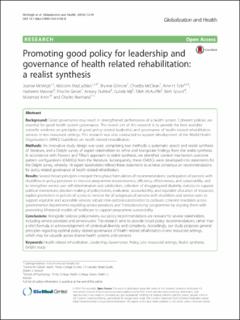| dc.contributor.author | McVeigh, Joanne | |
| dc.contributor.author | MacLachlan, Malcolm | |
| dc.contributor.author | Gilmore, Brynne | |
| dc.contributor.author | McClean, Chiedza | |
| dc.contributor.author | Eide, Arne Henning | |
| dc.contributor.author | Mannan, Hasheem | |
| dc.contributor.author | Geiser, Priscille | |
| dc.contributor.author | Duttine, Antony | |
| dc.contributor.author | Mji, Gubela | |
| dc.contributor.author | McAuliffe, Eilish | |
| dc.contributor.author | Sprunt, Beth | |
| dc.contributor.author | Amin, Mutamad | |
| dc.contributor.author | Normand, Charles | |
| dc.date.accessioned | 2020-06-08T10:53:23Z | |
| dc.date.available | 2020-06-08T10:53:23Z | |
| dc.date.created | 2016-09-15T16:26:06Z | |
| dc.date.issued | 2016 | |
| dc.identifier.citation | Globalization and Health. 2016, 12:49 1-18. | en_US |
| dc.identifier.issn | 1744-8603 | |
| dc.identifier.uri | https://hdl.handle.net/11250/2657191 | |
| dc.description.abstract | Background Good governance may result in strengthened performance of a health system. Coherent policies are essential for good health system governance. The overall aim of this research is to provide the best available scientific evidence on principles of good policy related leadership and governance of health related rehabilitation services in less resourced settings. This research was also conducted to support development of the World Health Organization’s (WHO) Guidelines on health related rehabilitation. Methods An innovative study design was used, comprising two methods: a systematic search and realist synthesis of literature, and a Delphi survey of expert stakeholders to refine and triangulate findings from the realist synthesis. In accordance with Pawson and Tilley’s approach to realist synthesis, we identified context mechanism outcome pattern configurations (CMOCs) from the literature. Subsequently, these CMOCs were developed into statements for the Delphi survey, whereby 18 expert stakeholders refined these statements to achieve consensus on recommendations for policy related governance of health related rehabilitation. Results Several broad principles emerged throughout formulation of recommendations: participation of persons with disabilities in policy processes to improve programme responsiveness, efficiency, effectiveness, and sustainability, and to strengthen service-user self-determination and satisfaction; collection of disaggregated disability statistics to support political momentum, decision-making of policymakers, evaluation, accountability, and equitable allocation of resources; explicit promotion in policies of access to services for all subgroups of persons with disabilities and service-users to support equitable and accessible services; robust inter-sectoral coordination to cultivate coherent mandates across governmental departments regarding service provision; and ‘institutionalizing’ programmes by aligning them with preexisting Ministerial models of healthcare to support programme sustainability. Conclusions Alongside national policymakers, our policy recommendations are relevant for several stakeholders, including service providers and service-users. This research aims to provide broad policy recommendations, rather than a strict formula, in acknowledgement of contextual diversity and complexity. Accordingly, our study proposes general principles regarding optimal policy related governance of health related rehabilitation in less resourced settings, which may be valuable across diverse health systems and contexts. | en_US |
| dc.language.iso | eng | en_US |
| dc.publisher | BMC | en_US |
| dc.rights | Navngivelse 4.0 Internasjonal | * |
| dc.rights.uri | http://creativecommons.org/licenses/by/4.0/deed.no | * |
| dc.title | Promoting good policy for leadership and governance of health related rehabilitation: a realist synthesis | en_US |
| dc.type | Peer reviewed | en_US |
| dc.type | Journal article | en_US |
| dc.description.version | publishedVersion | en_US |
| dc.source.pagenumber | 1-18 | en_US |
| dc.source.volume | 12:49 | en_US |
| dc.source.journal | Globalization and Health | en_US |
| dc.identifier.doi | 10.1186/s12992-016-0182-8 | |
| dc.identifier.cristin | 1381917 | |
| dc.description.localcode | © 2016 The Author(s).Open Access This article is distributed under the terms of the Creative Commons Attribution 4.0 International License (http://creativecommons.org/licenses/by/4.0/), which permits unrestricted use, distribution, and reproduction in any medium, provided you give appropriate credit to the original author(s) and the source, provide a link to the Creative Commons license, and indicate if changes were made. | en_US |
| cristin.ispublished | true | |
| cristin.fulltext | original | |
| cristin.qualitycode | 1 | |

